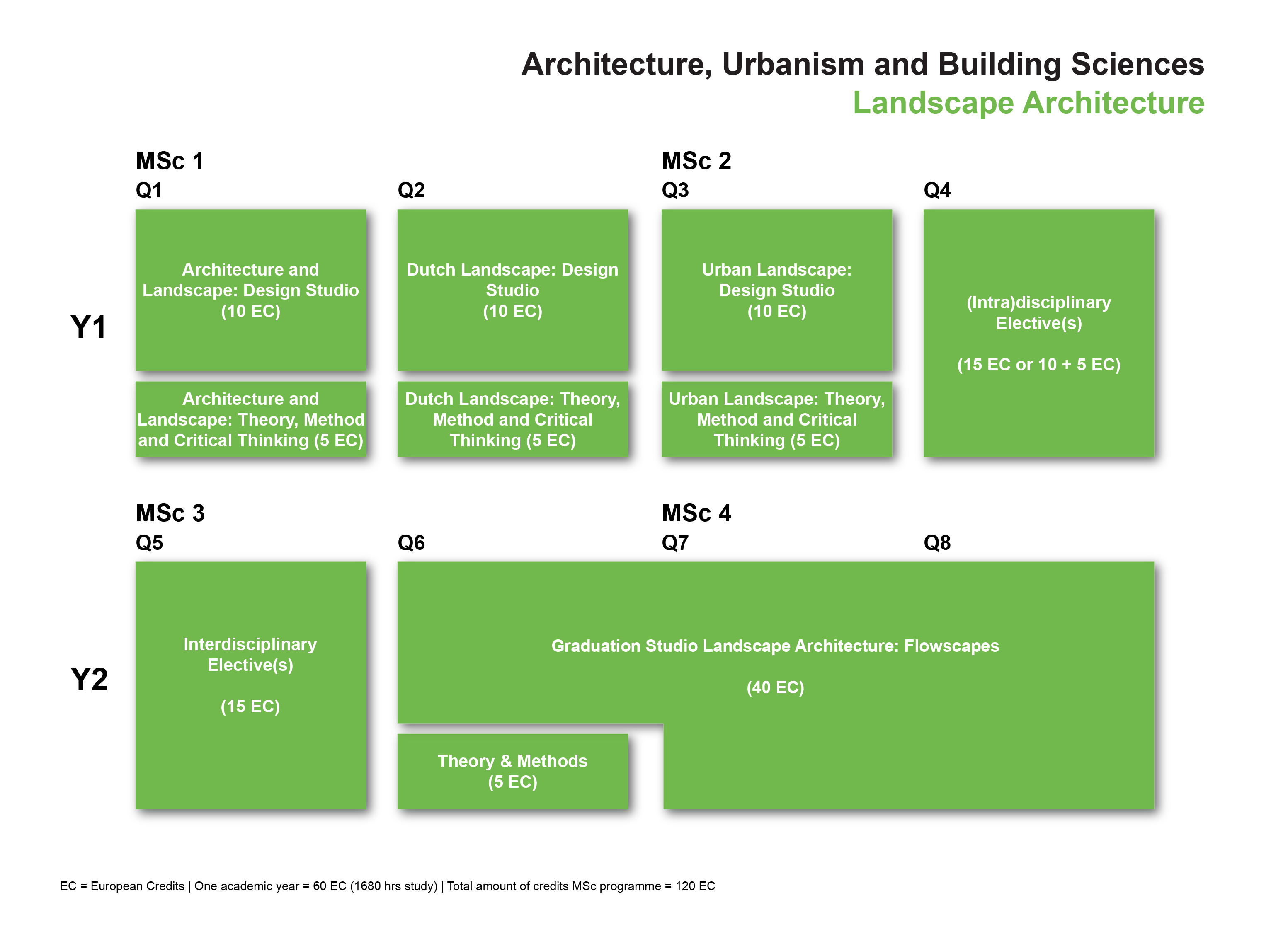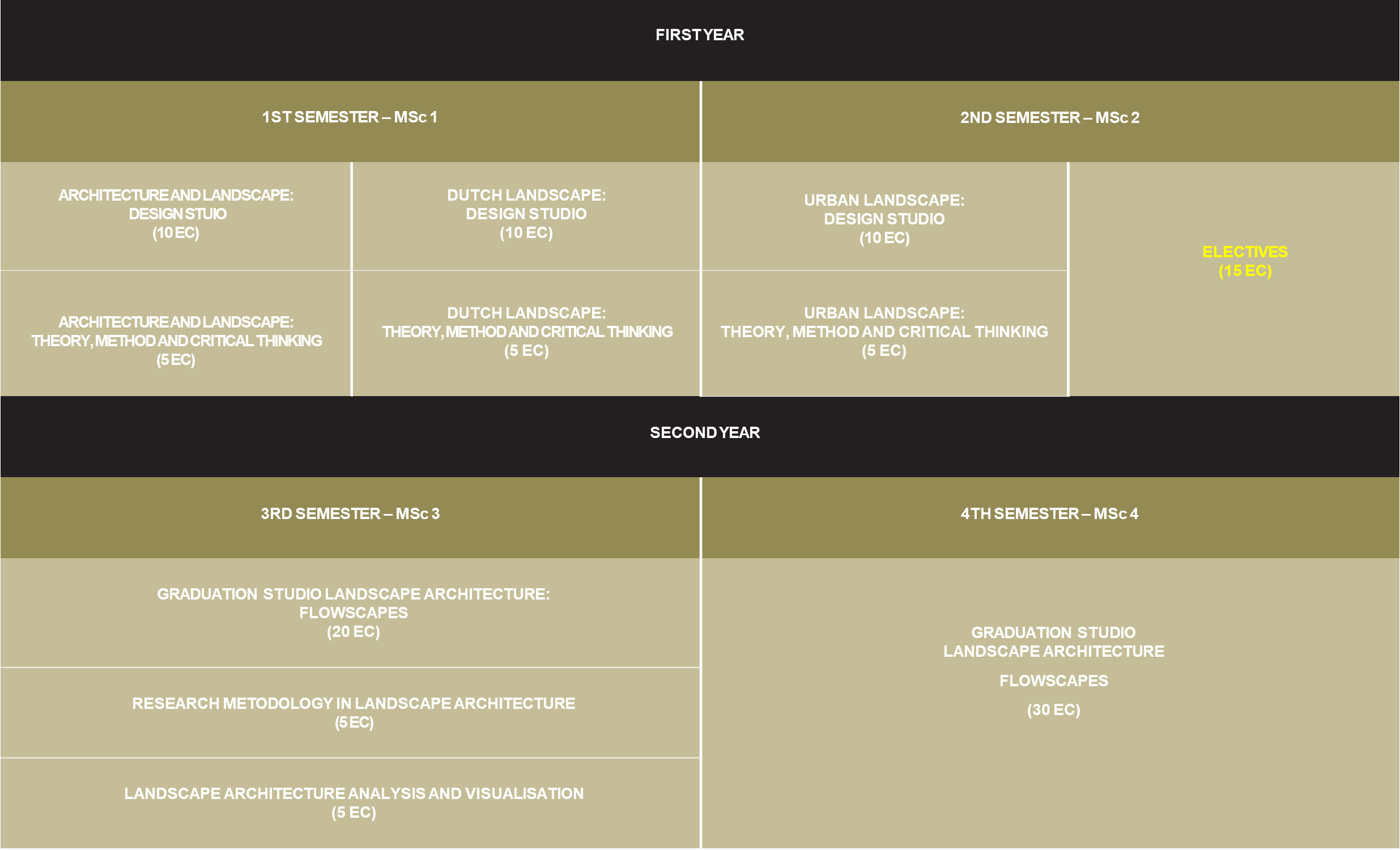Landscape Architecture
The Landscape Architecture track deals with making space inspired by nature, art and technology whereby the formal, material and cultural qualities of the site form the departure of the design. The track teaches students to transform and create compositions ‘through’ scale, time and as a process. Landscape Architecture is an independent design discipline strongly related to Urbanism and Architecture.
Freshly started in September 2024?
Did you start freshly this Master track programme in september 2024? Please see your track programme here. More programme information is available on the TU Delft website.
First year
The first three quarters of the programme are complementary and introduce you to the fundamental domains of Landscape Architecture.
In addition to developing your design skills, you acquire knowledge of plants and vegetation types, soils, hydrology, ecology, sociology, landscape history and theory of landscape architecture. Integrated in the landscape design projects several architectural aspects and different urban contexts are addressed. Field trips complement lecturing and studio work.
In the fourth quarter (Q4) you join one of the intradisciplinary courses in which you are challenged to work together with students from other tracks within the Master Architecture, Urbanism and Building Sciences on overarching themes.
Check the Study Guide for a full overview of the intradisciplinary electives available to Landscape Architecture track students.
Track programme Landschape Architecture 2023-2025
Attention! This information is only meant for students who started the Track programme Landscape Architecture in September 2023 or earlier!
First year
The first three quarters (Q1, Q2 and Q3) of the programme are compulsory and introduce you to the fundamental domains and approaches in Landscape Architecture.
In addition to developing your design skills, you acquire knowledge of plants and vegetation types, soils, hydrology, ecology, sociology, landscape history and theory of landscape architecture. Integrated in the landscape design projects several architectural aspects and different urban contexts are addressed. Field trips complement lecturing and studio work.
In the fourth quarter of the first year, students are free to choose electives offered by Landscape Architecture or one of the other Master AUBS tracks, or by another university master's programme, as long as the 15 EC of electives are obtained while enrolled as a master track Landscape Architecture student at TU Delft.
See the study guide for an overview of optional courses offered by the Landscape Architecture track (from academic year 2024-2025 these are called (intra)disciplinary electives). These electives are taught by Landscape Architecture staff, or in collaboration with staff from other Master AUBS tracks.
Registration of electives
To include electives offered by our faculty or other TU Delft programmes in your Study Progress Overview in Osiris, you have to submit the Master Electives list form. You can do this in advance, if you want to be sure that your courses will be accepted, or after completion.
If no request is submitted, the results will be registered as “other” in Osiris. This means that they will not be part of your required study programme and will not be listed on your diploma supplement.
For elective courses (to be) completed at other universities you must use the Certificate of incorporation to submit your request for approval by the Board of Examiners to include them in your study programme.
Second year
The second year is dedicated to the preparation, elaboration and finalisation of an individual graduation project. The core of the graduation year (MSc3/4) is the Flowscapes Graduation Studio (AR3LA031; 20 EC + AR4LA010; 30 EC) supported by two related courses: Research Methodology in Landscape Architecture (AR3LA020; 5 EC), and Analysis and Visualisation (AR3LA011; 5 EC).
The Flowscapes Graduation Studio relates to the projects and activities within our research portfolio Landscape Systems and Compositions. A variety of so-called ‘graduation labs’ enable students - working in small groups - to contribute to a specific research theme or topic. In the first semester of the second year (MSc 3), students develop a study plan and a research proposal including a methodology for the graduation thesis. In the second semester (MSc 4), the project becomes a fulltime effort. Students receive periodical feedback from the first (the lab coordinator) and second mentor (from an adjacent section or department).
More detailed information about the graduation studio Flowscapes graduation can be found on the TU Delft website. Practical information about graduation in general can be found here and in the Graduation Manual.

